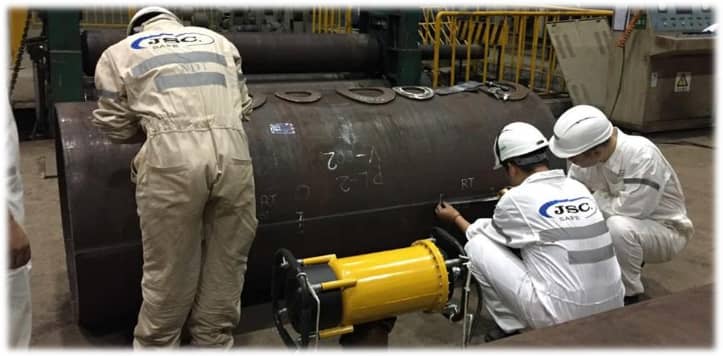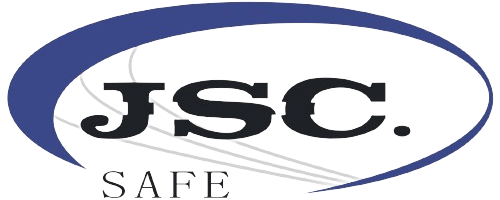 JSC is an ISO 17025 NDT Lab / Company (CNAS)
JSC is an ISO 17025 NDT Lab / Company (CNAS)
ISO/IEC 17025:2017 is an international standard specifying requirements for quality and competence in testing and calibration laboratories. The standard requires that such labs prioritise excellent quality practices and develop a reliable quality management system to establish and demonstrate their competence.
The full standard is called ISO/IEC 17025, since the certification was created by the International Organization for Standardization in conjunction with the International Electrotechnical Commission. However, many shorten this to ISO 17025 or simply 17025 certification when referring to the standard.
Ultimately, ISO 17025 is for any organization that performs testing, sampling or calibration and wants to be sure of the reliability of their results. The simplest way we can put it: if you work in a testing environment that produces measurable results, then ISO 17025 is probably applicable. This may even mean you don’t necessarily call your facility a “lab,” but by ISO standards, you would be considered a laboratory if you are producing measurable results.
Who is ISO/IEC 17025 for?
ISO/IEC 17025 is applicable to many different testing and calibration facilities across a range of sectors. The forensics sector is an example of one area that has almost universally adopted ISO/IEC 17025 as the main indicator of quality in its labs. But laboratories in sectors as diverse as asbestos testing, acoustics, chemicals, fibre optics, food production, textiles, and even cannabis labs are certified to ISO 17025 standards.
Medical laboratories are one slight exception. Labs looking for an internationally recognised standard of quality in medical labs should look into ISO 15189 certification, as this is the standard that applies specifically to med labs. If you work in a medical lab, for example a pathology lab or in a clinical trial environment, you will find all the information you need about ISO 15189 in our dedicated knowledge hub.
ISO 17025 is of high importance for testing and calibration labs because it is globally recognized. Accreditation allows you to ensure and demonstrate the reliability of your results as well as the integrity, competence, and overall quality of your lab’s practices. It also includes demands for proficiency testing, which serves as another clear indicator of your lab’s competence. We discussed proficiency testing and its importance as part of ISO 17025 in a recent webinar.
It can be crucial to the perception of your organization as credible, trustworthy and competent to current and potential customers or business partners. That’s without even mentioning the fact that many government organisations around the world will have such accreditation as a strict prerequisite before looking to work with you.
Want to learn more about ISO/IEC 17025 and how Ideagen software can help with compliance? Visit our knowledge hub for free webinars, downloads and success stories.
Is ISO/IEC 17025 a requirement for testing and calibration laboratories?
While ISO/IEC 17025 is not mandatory, it is highly recommended across the world. Especially when the accuracy – or rather, the inaccuracy – of your results can have serious consequences, it might be better to ask whether you can afford to not be accredited. Whether your results dictate the safety of building materials, or provide key insights to the forensics sector as part of important investigations, it pays to have this guarantor of the reliability and validity of your results.
Certification to ISO 17025 also facilitates cooperation between labs and other bodies. By meeting a globally recognized standard, there will be wider acceptance of results across borders, meaning test reports and certificates can be accepted in one country from another without any need for further tests. This really helps to facilitate and improve international trade.
Another considerable advantage is that it enables better data sharing. More laboratories carrying out the same tests to the same standards internationally will mean a greater pool of data to work from in many industries. As the 2020s roll on, we are seeing the huge benefits to be reaped from having access to more data. From AI predictive models to having a better grasp of common risks, a global push for consistent data is greatly aided by the adoption of certifications like ISO/IEC 17025.
These are not the only benefits to ISO/IEC 17025 accreditation. Below, you will find a list of more benefits to getting certified if you are not yet convinced.
What are the benefits of ISO 17025 accreditation?
There are a number of important benefits to achieving ISO/IEC 17025 certification. This includes:
- Institutions around the world can be assured of the quality of your practices and reliability of your results
- You meet the ever-growing demand for globally consistent data
- You can increase your reputation both internationally and domestically
- Meeting such a standard is often a prerequisite for tender application processes
- Your chances of achieving a preferred partner status are greatly increased with both prospective and current customers
- Have a clear advantage over your competitors who do not hold ISO 17025 accreditation
- You will be elevated to the same reputational standard as competitors who already hold certification
- You can reduce costs by implementing more efficient practices while also avoiding costly mistakes
- Time can be saved as numerous time-consuming tasks are automated
- Risks are proactively managed, heading off potential negative impact on equipment and services
- Centrally held documents and key information creates a single source of truth across your organization
- You will be set up to work towards continual improvement, driving positive results for a range of KPIs
- Using powerful quality management software that is reliable and efficient can make all the difference in reaping the rewards of ISO/IEC 17025 certification, enabling you to go beyond compliance and in to continual improvement.
From managing training and professional development, to organizing audits in an organized fashion, the right QMS helps reduce the time and effort needed for essential quality management tasks in testing and calibration labs. This allows you to concentrate on the quality of service provided while using the software’s insights to pursue enhancements. Ideagen QMS makes achieving these goals easy.
How to attain ISO/IEC 17025 accreditation
If you are confident in your quality management systems, you can apply to a relevant accreditation body in your country. With most accreditation bodies, the application process is online.
In the UK, the United Kingdom Accreditation Service (UKAS) is one of the main accreditation bodies. In the US, it is A2LA or ANAB that provide ISO/IEC 17025 certification. Other bodies exist globally, such as the International Accreditation Service (IAS), and there are also other national-level bodies like COFRAC (France) and DANAK (Denmark).
After you apply, a pre-assessment is usually carried out. The accrediting body will identify any significant issues that will need addressing before your official assessment. This is often referred to as your “audit gap analysis” and is the stage at which you may realize your quality management system needs a significant overhaul or modernization. This can best be achieved by using tried and tested quality management software.
Once you have addressed these issues, you will then be audited against the criteria detailed in ISO/IEC 17025. Attaining certification will usually take somewhere between 3 and 6 months, but this can vary based on what quality management systems you already have in place, the number of issues that are identified, or simply how busy your chosen accreditation body is. However, 3 to 6 months for a lab to become certified is a common timeframe for most accreditation bodies.
Maintaining ISO 17025 accreditation
We’ll explain this process based on how you maintain accreditation through UKAS, but the process is very similar across accreditation bodies worldwide. You will initially enter a “surveillance” period, meaning that UKAS will check up on your processes every year, checking for obvious breaches of ISO 17025 compliance. Every 4 years, UKAS will carry out a full re-assessment. This is how the assessment cycle will look.
While the surveillance and re-assessment process varies depending on the accreditation body, the process will almost certainly follow the same pattern as UKAS: periodic surveillance check-ups with a full re-assessment after a pre-defined number of years, usually 3 or 4 years.
The most effective way to ensure you remain compliant with the requirements of ISO/IEC 17025 is to use effective quality management software. The software will enable you to foster a culture of quality throughout your operation and therefore maintain compliance with ease.
Want to learn more about ISO/IEC 17025?
If you’re convinced of the benefits of ISO/IEC 17025 accreditation, the next best step is to give yourself all the tools to achieve and maintain accreditation. We ran a webinar series on the most common ways labs are non-conformant with ISO/IEC 17025. Over these 5 episodes, you can learn the key dos and don’ts for your lab when looking to achieve ISO 17025 certification.
